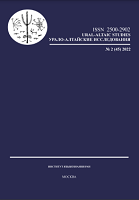Энецкие показатели каритива и их прасамодийские источники
Enets caritive markers and their Proto-Samoyedic sources
Author(s): Anna Yu. UrmanchievaSubject(s): Historical Linguistics, Comparative Linguistics, Sociolinguistics, Descriptive linguistics
Published by: Институт языкознания Российской академии наук
Keywords: Enets language; Samoyedic languages; caritive; comparative studies; reconstruction;
Summary/Abstract: The article examines three caritive markers in the Enets language: a verbal one -se (‘not to have something’), an attributive one -seδa/-seδe (‘(a person) not having something’) and an adverbial one -śuδiɁ (‘being without something’). It analyzes their Samoyedic cognates, both quite transparent and less obvious ones. The etymology of the attributive caritive marker is quite transparent even at the synchronic level: the forms of the attributive caritive (-se-δe) are imperfective participles from verbal caritive forms (-se). However, the formation of the imperfective participle in Enets in this case is accompanied by a complicated morphonological phenomenon: the form of the participial morpheme (-δe) with a fricative rather than a stop points to a glide that precedes that participial marker. Based on its Nganasan (adverbial caritive marker -kaj) and Mator (attributive caritive marker -gǝsta/-kǝsta) cognates, a protoform with the glide *j is reconstructed: for the verbal caritive, *-kaj, for the attributive caritive, *-kaj-ntå-jǝ̑. The etymology of the adverbial caritive marker -śuδiɁ is somewhat less obvious. The final -Ɂ is a reflex of the Proto-Northern Samoyedic adverbializer, which is used to form adverbs from adjectives (and causes the change of the quality of the preceding vowel). Accordingly, the adverbial form -śuδiɁ is formed from the hypothetical attributive form **-śuδe, which also resembles a participial form (-śu-δe). The allomorph of the participial marker (-δe) also points to a preceding etymological glide. In Mator, there is another caritive marker -gǝda/-kǝda, which can only go back to *-kaw-ntå(-jǝ̑): the protoform without the glide would have resulted in Mator **-gǝnda/-kǝnda, the protoform with the glide *j results in another Mator caritive marker -gǝsta /-kǝsta, mentioned above. The glide *w can also explain the appearance of the close back rounded vowel in Enets -śuδiɁ.
Journal: Урало-алтайские исследования
- Issue Year: 2022
- Issue No: 02 (45)
- Page Range: 141-147
- Page Count: 7
- Language: Russian

